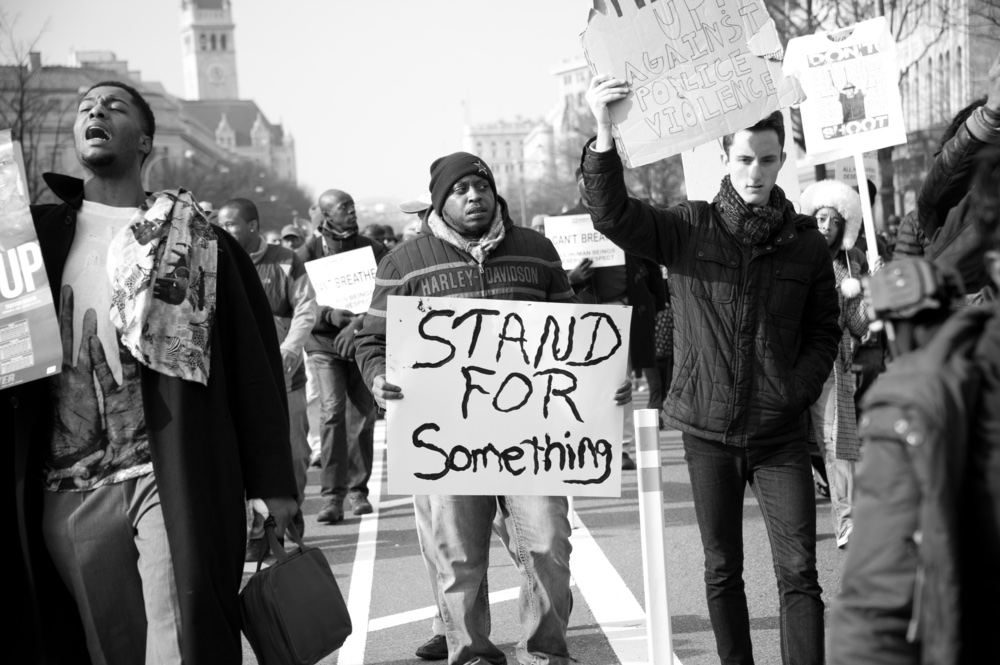How Can White People Contribute to a Better World?
By Adrienne Lauby

You know how it is when someone says something disparaging about “white men” and then suddenly there’s an awareness that there is a white man in the room? Have you noticed people rushing to reassure the guy, “We’re really not talking about you.” Or, in other situations seen people respond with, “Oh come on. You were one of the rulers of the universe and now you want us to worry about your feelings!” Both responses hold some truth and some lie.
Without untangling the blame and shame, let’s talk about attitudes white people will, hopefully, find useful in our current situation.
Presently, the position of white people in our society in relationship to black and brown people is metaphorically similar to that white man. As a group we are responsible for enormous harm and we live among the victims of that harm. Individually, or as a group, we are likely to experience hostility to our race and dismissal of ourselves because of our skin color. That’s normal.
In the U.S. white people are going to be a minority, not because of racial rights or wrongs, but due to a historical reality. California is now a majority minority state – with less white people than black or brown (61% to 64%). This difference will likely continue and grow. We also see the black and brown community taking up more of its share of the communal space, whether in the leadership and ritual of Kamala Harris as vice president, or in more brown people coming to live in my little town.
“Recognize and understand
your emotional reactions
so you can respond”
It’s worthwhile to think of what this means. Often, it’s only small shifts – more Spanish language, slightly different music, and awkward moments when we miss a cultural cue or reference. But sometimes it brings us face-to-face with history and the need to deal with long-standing inequality.
There are efforts toward a period of justice and reconciliation, as white people look hard at the damage they, and people in their name, have inflicted on Black, brown, indigenous and other people of color. There are efforts toward a period of apology and reparations.
But, even if these efforts are wildly successful; even if massive numbers of white people come to understand the history and the emotional/physical damage white people have done; even if there are enormous efforts to heal past harms and bring economic parity – it would not be enough. Nothing can balance the harm and brutality of 500 years of Native genocide, 400 years of slavery, Jim Crow and mass-incarceration.
No repair is enough.
And, yet, despite the fraught nature of our history and current inequity, white people have a duty and desire to contribute. Right now, democracy needs all of us; the planet needs all of us; and the next generations need all of us. And, by “all of us,” I mean all of us working together in relationships, groups and communities.
How can I, as a white person, contribute? How can I advance the psychological health of racially diverse relationships, groups and community?*
A few thoughts:
- Be humble.
- Notice your visceral response to a racially charged moment and take the time you need to examine it. Try not to jump to self-defense; try to respond from your best rational, caring self.
- Realize it’s not always about you even when someone criticizes you directly and specifically.
- Find anti-racist white people for support and feedback.
- If you recognize a misstep or are criticized, allow yourself a minute (or more) to recognize and understand your feelings so you can respond.
- Apologize when you unknowingly hurt a person of color.
- Expect that you will be likely be more a follower/supporter than a leader – and bask in that role.
- Acknowledge that anger toward you as a white person is reasonable. Notice how it feels to be stereotyped and get on with forging relationships and building a healthy community.
- Remember a healthy community is not about your reputation, your need to be acknowledged or praised, or your need to be comforted and soothed.
- Understand that being uncomfortable comes with a changing situation. Expect that everyone, even if they appear confident, is likely uncomfortable to some degree.
- Look for communal advances, work for positive outcomes for everyone in the room.
- Do your best work; be your best self.
——————————————.
Posted: 8-30-22

Leave a Reply